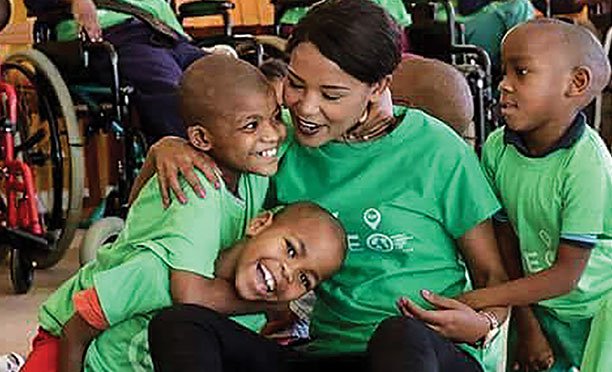Badenhorst shines the light on cerebral palsy
At the age of seven (7) Ame Badenhorst has yet to take her first step. She actually can’t even stand on her own and is fed using tubes.
But her mother Mysie (24) who resides in Tsolamosese is not losing hope that the little girl will walk like any other child and overcome the limitations attributed to cerebral palsy, whose symptoms Ame started showing at birth.
Cerebral Palsy (CP) generally refers to a range of disorders affecting a person’s movement, muscle tone, balance and posture. It is caused by damage to the developing brain either during pregnancy or shortly after birth.
Mysie says she had a normal pregnancy and Ame was the picture of good health up until she gave birth to her. “There were complications during labour, as I was not properly dilating. The doctor delayed performing a C-section and by the time he did, I had blacked out, my child was not getting enough oxygen and she had a stroke.
“Immediately after I gave birth to her she convulsed. She failed her Apgar score (the first few minutes check whether everything is okay with baby) and so right at birth I knew something was not right. And so, I watched her like a hawk from the day we got her home.
“I noticed the stiffness in her legs from about 3 weeks old but midwives at the clinic kept dismissing me saying, ‘she is a happy but a little slow child’. It was only after I sought second and third opinions at private hospitals that they finally agreed with me that there was a problem and put her on medication.
“She was missing her milestones, couldn’t sit up, she didn’t learn to crawl and couldn’t pull herself up.”When Ame needs to sit up, mom must still hold and prop up her body or she would fall over and hit the floor headfirst. “That is our life.
I think Ame has come a long way however because I talked to the right people and was informed about cerebral palsy early on, which unfortunately many mothers lack,” Mysie said.
This was the motivation behind the formation of Cerebal Palsy Association of Botswana (CPAB), which she founded in 2016.
So far she has identified more than 493 families, which deal with CP in Francistown and Gaborone. “Batswana in general still have very poor recognition and awareness of cerebral palsy. They have a child who moves slowly, and they say ‘Ah, he’s just slow. He’ll soon catch up,’ ” she said in an interview.
They usually wait for symptoms of a serious illness to appear before taking the child to the hospital, she added. Others mistake cerebral palsy for other conditions, like autism, again due to lack of information, Mysie noted.
Even supposed experts can make inaccurate findings, hence it is not uncommon for a family who consults two or more therapists to hear different opinions or diagnoses. “Like all existing programmes or problems in the disability sector, there is still a lack of education among those who are dealing with cerebral palsy, maybe even among the doctors and other health professionals.”
For Mysie, the government can do much more to empower affected families. A good start is for health workers to be more proactive and seek out cerebral palsy sufferers in the community. “Information dissemination about cerebral palsy should be strengthened.
Teach local health workers about surveillance and monitoring. They are so hungry for knowledge,” she said.A national census of persons with disabilities, including cerebral palsy, is needed for the government to craft programmes specially designed for that sector.
Unfortunately, there is still “no good national census that asks about disability,” hence no official figures on cerebral palsy cases.Through CPAB, Mysie wanted to step up to the plate and shine a light on the condition. Not only that but to support and teach parents about the importance of sticking to the medication and the physiotherapy they need.
“For those in rural areas especially, who can’t afford regular physiotherapy session we give basic lessons on massaging them at home. It is critical”.




